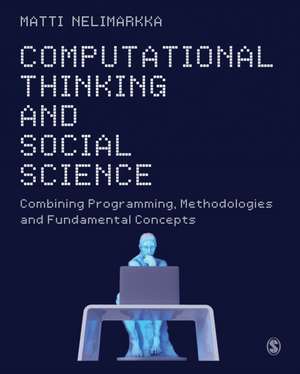Computational Thinking and Social Science: Combining Programming, Methodologies and Fundamental Concepts
Autor Matti Nelimarkkaen Limba Engleză Paperback – 13 ian 2023
Key features include:
- Further reading
- Exercises accompanied by sample code
- Programming examples in Scratch, Python and R
- Key concepts
- Chapter summaries
| Toate formatele și edițiile | Preț | Express |
|---|---|---|
| Paperback (1) | 378.82 lei 3-5 săpt. | +34.17 lei 6-12 zile |
| SAGE Publications – 13 ian 2023 | 378.82 lei 3-5 săpt. | +34.17 lei 6-12 zile |
| Hardback (1) | 962.68 lei 6-8 săpt. | |
| SAGE Publications – 13 ian 2023 | 962.68 lei 6-8 săpt. |
Preț: 378.82 lei
Nou
Puncte Express: 568
Preț estimativ în valută:
72.50€ • 75.59$ • 60.25£
72.50€ • 75.59$ • 60.25£
Carte disponibilă
Livrare economică 28 februarie-14 martie
Livrare express 13-19 februarie pentru 44.16 lei
Preluare comenzi: 021 569.72.76
Specificații
ISBN-13: 9781526497918
ISBN-10: 1526497913
Pagini: 408
Dimensiuni: 186 x 232 x 22 mm
Greutate: 0.66 kg
Ediția:1
Editura: SAGE Publications
Colecția Sage Publications Ltd
Locul publicării:London, United Kingdom
ISBN-10: 1526497913
Pagini: 408
Dimensiuni: 186 x 232 x 22 mm
Greutate: 0.66 kg
Ediția:1
Editura: SAGE Publications
Colecția Sage Publications Ltd
Locul publicării:London, United Kingdom
Cuprins
New kind of social science requires new skills
Computational Thinking, Algorithms and Writing Code
Data Science
Network Analysis
Data Structures
Simulations and Complex Systems
Interactive Systems
Best Practice for Software Development
Computation and Data: Collection, Storage and Manipulation
Computational Social Science
Research Ethics in Computational Social Science
Mistakes and Quality of Results in Computational Social Sciences
Integrating Computational Methods in Research
Computational Thinking, Algorithms and Writing Code
Data Science
Network Analysis
Data Structures
Simulations and Complex Systems
Interactive Systems
Best Practice for Software Development
Computation and Data: Collection, Storage and Manipulation
Computational Social Science
Research Ethics in Computational Social Science
Mistakes and Quality of Results in Computational Social Sciences
Integrating Computational Methods in Research
Notă biografică
Matti Nelimarkka has over a decade of experience in teaching programming: from high school students and freshmen in computer sciences to generic introduction courses for STEM and social science students. He also regularly teaches research method, both traditional and computational to students in STEM and social science, with a special focus on graduate students and advanced computational research methods. His experiences combined with research-based insights on programming education provide him a deep understanding how to make learning fruitful and effective for students.
In his scholarly work on computational social science, Dr. Nelimarkka has focused on the essential role of social science theories to structure research formulation and then pinpointing and ¿ when necessarily ¿ developing new tools and approaches to tease out an answer to this question. In addition, his work in the critical algorithm studies gives insights to the challenges of reliability and validity, often not sufficiently addressed in computational social science.
This book brings together his experiences across programming and conducting social science has led him to develop an approach where computational thinking and programming are blended with empirical research questions and methods and for higher level questions of doing new kind scholarly work with social science.
In his scholarly work on computational social science, Dr. Nelimarkka has focused on the essential role of social science theories to structure research formulation and then pinpointing and ¿ when necessarily ¿ developing new tools and approaches to tease out an answer to this question. In addition, his work in the critical algorithm studies gives insights to the challenges of reliability and validity, often not sufficiently addressed in computational social science.
This book brings together his experiences across programming and conducting social science has led him to develop an approach where computational thinking and programming are blended with empirical research questions and methods and for higher level questions of doing new kind scholarly work with social science.
Descriere
This book provides fundamental understanding into computational social science, helping students build basic familiarity with programming and an in-depth understanding into the challenges and benefits within the field.
